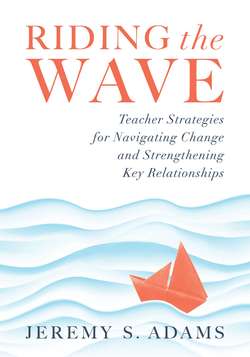Читать книгу Riding the Wave - Jeremy S. Adams - Страница 27
На сайте Литреса книга снята с продажи.
Strategy 3: Learn the Difference Between Good and Bad Coping
ОглавлениеEvery teacher has a unique way of coping with stress, and teachers hoping to successfully confront challenges and changes will need to reflect on their go-to strategies. Professor Cameron Montgomery and research director André Rupp (2005) make a distinction between active coping and passive coping strategies, and they say the most effective teachers thoughtfully embrace the former.
Teachers frequently engage in passive coping, but this coping style is usually detrimental to the long-term viability of teaching success. Montgomery and Rupp (2005) pinpoint a number of passive coping behaviors, including “resignation, drinking, wishful thinking, and avoidance” (p. 468). These behaviors in turn can result in “anxiety, depression, or even suicidal ideation” (Montgomery & Rupp, 2005, p. 468). Passive coping strategies are almost all short term in nature and can be broadly described as avoidances of taxing classroom realities. Such strategies don’t fix the root of the problem but rather delay a person’s facing those problems he or she must inevitably deal with.
Active coping, on the other hand, generally takes the form of “cognitive strategies” such as “changing perspective,” “exerting self-control,” and “rationally distancing oneself” (Montgomery & Rupp, 2005, p. 468). This form of coping can also be emotional in nature and involve “setting limits for work,” “seeking advice from others,” and “engaging in relaxation exercises” (Montgomery & Rupp, 2005, p. 468).
RIDE the WAVE
STRATEGY 2
List up to five colleagues whose advice you value. These are people you would call on first if you needed advice or if you simply wanted to vent. Next to each name, write a sentence or two about why you think he or she would be a good person to seek out.
1.
2.
3.
4.
5.
Visit go.SolutionTree.com/teacherefficacy for a free reproducible version of this feature box.
Active coping mechanisms provide you with cognitive and emotional capacities that will empower you, as a classroom teacher, to contextualize your teaching life by enhancing your perspective on your career and personal life. For example, a particular year of teaching may be trying, but an affirming form of coping will allow you to recognize that the difficult period will eventually end. A specific student may be challenging, but a successful episode of active coping will help you realize that most students are not difficult or a source of frustration. Also, active coping helps you realize that although your job might be a source of stress, that does not negate the blessings of your home life or remove all the interests you have outside of school.
